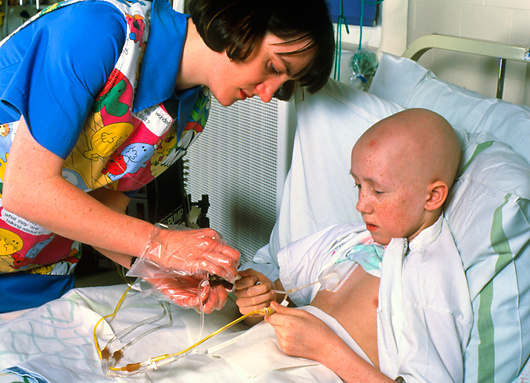Skin Symptoms course for Medical Doctors



This session covers the investigation and treatment of skin symptoms for children receiving palliative care.
Learning Objectives
By the end of this session you will be able to:
- Describe the process you should use when investigating skin symptoms
- Recognise different types of skin rash
- Consider differential diagnoses
- Select appropriate treatment
- State how to deal with pressure sores and ulcerating (fungating) tumours
In this session, we will take the example of a child with a malignancy who presents with an itchy, red rash to understand the process you should follow when investigating skin symptoms.
Before commencing this session you should complete:
- Pain Management (172-43)
Helen has been working in Paediatrics for over 30 years and has been a Consultant Paediatrician at Heart of England NHS Foundation Trust since 1995. She is a General Paediatrician with a special interest in Paediatric dermatology. She is an educational supervisor for trainees in Paediatrics, the Foundation years and broad based training.
She has a strong interest in Medical Education and is an Associate Postgraduate Dean in the West Midlands for careers, less than fulltime training and professional support. She has also been Head of the School of Paediatrics in the West Midlands since the postgraduate Schools were set up in 2007. She is strongly committed to improving the standard of training and ensuring that assessments are fair and performed well. She enjoys teaching and undertakes this on a variety of courses either in Paediatric Dermatology or medical education. She has a number of publications on these topics in peer reviewed journals. Helen has a MD which looked at herpes simplex virus infections in children with atopic eczema, a Master’s degree in Medical Education and a MA in Managing Health Care careers (distinction) which looked at the Wellbeing of Foundation year one doctors.
Helen worked less than fulltime for 11 years, training less than fulltime under the PM(79)3 scheme in the early 1990s and then took up a part time consultant post. She was the RCPCH advisor for LTFT training 2003-9 and chaired the Improving Working lives committee 2005-7. Since 2012, she has been the RCPCH lead for the Effective Educational supervisors course ,drew up and developed the material and this course is now taught nationally several times per year. Helen has written modules on paediatric dermatology for elearning for healthcare, developed 5 elearning modules for Health Education West Midlands which are currently being revised for e-lfh and leads the team developing 25 e learning modules on Paediatric SCRIPT (prescribing).

- Anaesthesia Fundamentals | Physiology | Transfusio...
- Posted By eIntegrity Healthcare e-Learning
- Posted Date: 2024-11-13
- Location:Online
- This session describes the immediate, early and late complications of transfusion, as well as the complications of massive blood transfusion.
- Anaesthesia Fundamentals | Physiology | Transfusio...
- Posted By eIntegrity Healthcare e-Learning
- Posted Date: 2024-11-13
- Location:Online
- This session covers the immunology of transfusion, focusing on the most clinically-significant red blood cell antigen systems, ABO and Rhesus. Affiliated antibody systems and compatibility between individuals with these blood groups will also be described
- Anaesthesia Fundamentals | Physiology | Red Blood ...
- Posted By eIntegrity Healthcare e-Learning
- Posted Date: 2024-11-13
- Location:Online
- This session covers the structure and function of the erythrocyte, focusing on the biochemistry and physiology of normal haemoglobin. It will also describe the pathophysiology of the haemoglobinopathies and thalassaemias.
- Anaesthesia Fundamentals | Physiology | Metabolic ...
- Posted By eIntegrity Healthcare e-Learning
- Posted Date: 2024-11-13
- Location:Online
- This session provides an overview of the basic metabolic pathways and metabolic reactions. It also explains how the body produces and stores energy obtained from the main fuel sources — carbohydrates, proteins and fats.
- Anaesthesia Fundamentals | Physiology | Physiology...
- Posted By eIntegrity Healthcare e-Learning
- Posted Date: 2024-11-13
- Location:Online
- This session describes the physiology of nausea and vomiting. Topics covered include swallowing reflex, barrier pressure, agonist/receptor systems, afferent and efferent pathways and causes and consequences of postoperative nausea and vomiting.







